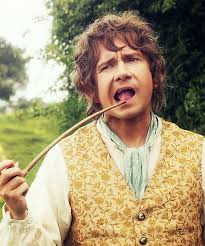A few months ago my friend Nick put up an excellent blog post entitled
Not All Who Wander Are Lost, taking his cue from this Tolkien quote to discuss the idea of Christians as pilgrims, subjects of Christ as King. I wouldn't think of this as responsive to that post, but of course I'd recommend you go read it anyway. He incidentally noted that probably most who wander are lost, which seems likely to me. And yet, one need not wander to become lost.
 |
| Also, many of those who do not wander are hobbits. |
It's amazing how "lost" one can get without ever knowingly straying from the path. That is, by a series of reasonable decisions with outcomes which may be anticipated, each of which fits neatly with the rest, it's quite possible nevertheless to stray far from the route intended. I've had frequent occasion over the last few months to reflect on decison-making processes and metrics, as well as the results I've obtained by them over the years. It's a topic that naturally fills untold shelves in the business and economics literature, but is easy to gloss over in the day to day. My contention is that we (or maybe just I) often only make medium-sized decisions. Things happen with regard to larger and smaller decisions, but I think it often falls short (or long) of conscious decision.
Sometimes you run into decisions that raise the stakes by inevitably impacting the way you live for the next year; the next five years; or the rest of your life. Visible, high-impact decisions can call everything into question, and decision-making in that context is as much about reaffirming and rightly understanding one's identity as it is about making the decision. The decision flows from identity, and identity is defined by the decision. We are in large part defined by the commitments we make and how we fulfill them or fail to do so. So the conscious decision to make or execute upon a commitment, or not, is defining of and reliant upon identity. It will make you and reveal you.
For the decisions big enough to warrant attention but not big enough to confront you with yourself, we think about it and do the best we can with the information available. That's the stuff of traditional economics, among other fields, and I needn't discuss it here.
I think the little things are more similar to the big than the medium. I don't have the time or energy to optimize every detail of my life. They are built into habit; the result of latent decisions or dispositions acted out in tiny ways again and again. Over time I can try to adjust things to improve them on a one-off basis, but frequently that will only go so far without acknowledging the habit, addressing an underlying issue of identity, or healing a sinful heart.
What this highlights, to me, is just how fundamentally and pervasively debasing are the effects of the fall, and how critical for thriving it is to know God well and be reconciled to Him. It is easy to become lost through the culmination of so many great and miniscule actions if we do not seek ardently after and hold fast to truth and an identity built upon the rock of our salvation.
I wonder, then, how many latent decisions I have made, large or small, without conscious deliberation. I wonder where I will discover one next. And I wonder if I will like what it reveals about my heart, or just show me to be lost, without having ever wandered.
